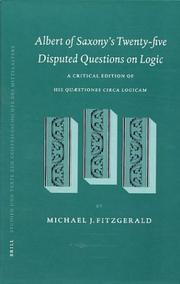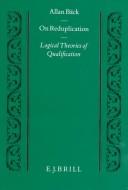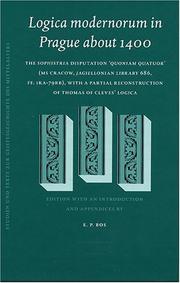| Listing 1 - 7 of 7 |
Sort by
|
Book
ISBN: 2503642020 9782503642024 Year: 1996 Volume: 1 92 120 Publisher: Turnhout: Brepols,
Abstract | Keywords | Export | Availability | Bookmark
 Loading...
Loading...Choose an application
- Reference Manager
- EndNote
- RefWorks (Direct export to RefWorks)
Medieval Latin language --- Latin language, Medieval and modern --- 16 <09> --- 470 --- Logica. Kennistheorie. Logische methodiek. Wetenschapsfilosofie--Geschiedenis van ... --- Language Latin --- 16 <09> Logica. Kennistheorie. Logische methodiek. Wetenschapsfilosofie--Geschiedenis van ... --- Logica. Kennistheorie. Logische methodiek. Wetenschapsfilosofie--Geschiedenis van .. --- Logica. Kennistheorie. Logische methodiek. Wetenschapsfilosofie--Geschiedenis van . --- Latin language, Medieval and modern - Glossaries, vocabularies, etc. --- Logica. Kennistheorie. Logische methodiek. Wetenschapsfilosofie--Geschiedenis van

ISBN: 9004125132 9004453482 Year: 2002 Volume: 79 Publisher: Leiden Boston Köln Brill
Abstract | Keywords | Export | Availability | Bookmark
 Loading...
Loading...Choose an application
- Reference Manager
- EndNote
- RefWorks (Direct export to RefWorks)
Logic --- Logicians --- Logique --- Logiciens --- Early works to 1800 --- Biography --- Ouvrages avant 1800 --- Biographie --- Albertus, --- 16 <09> --- Logica. Kennistheorie. Logische methodiek. Wetenschapsfilosofie--Geschiedenis van ... --- Albertus de Saxonia --- 16 <09> Logica. Kennistheorie. Logische methodiek. Wetenschapsfilosofie--Geschiedenis van ... --- De Saxe, Albert --- Logica. Kennistheorie. Logische methodiek. Wetenschapsfilosofie--Geschiedenis van .. --- Albert of Saxony --- Logica. Kennistheorie. Logische methodiek. Wetenschapsfilosofie--Geschiedenis van
Book
ISBN: 9789004360211 9789004360228 Year: 2017 Publisher: [S.l.] BRILL
Abstract | Keywords | Export | Availability | Bookmark
 Loading...
Loading...Choose an application
- Reference Manager
- EndNote
- RefWorks (Direct export to RefWorks)
"After a bibliographic introduction highlighting various research trends in science and religion, Joshua Moritz explores how the current academic and conceptual landscape of theology and science has been shaped by the history of science, even as theology has informed the philosophical foundations of science. The first part assesses the historical interactions of science and the Christian faith (looking at the cases of human dissection in the Middle Ages and the Galileo affair) in order to challenge the common notion that science and religion have always been at war. Part two investigates the nature of the interaction between science and Christian theology by exploring the role that metaphysical presuppositions and theological concepts have played - and continue to play - within the scientific process."--
215 --- 16 <09> --- 215.1 --- 215.1 Verhouding godsdienst en filosofie --- Verhouding godsdienst en filosofie --- 16 <09> Logica. Kennistheorie. Logische methodiek. Wetenschapsfilosofie--Geschiedenis van ... --- Logica. Kennistheorie. Logische methodiek. Wetenschapsfilosofie--Geschiedenis van ... --- 215 Godsdienst en wetenschap --- 215 Religion et science --- Godsdienst en wetenschap --- Religion et science --- Logica. Kennistheorie. Logische methodiek. Wetenschapsfilosofie--Geschiedenis van .. --- Religion and science --- Science --- Theology. --- Religion and science. --- Théologie --- Wissenschaft --- Wissenschaftsphilosophie --- Geschichte --- Geschichtswissenschaft --- Wissenschaftsgeschichtsschreibung --- History. --- Philosophy --- Philosophy. --- Logica. Kennistheorie. Logische methodiek. Wetenschapsfilosofie--Geschiedenis van . --- Logica. Kennistheorie. Logische methodiek. Wetenschapsfilosofie--Geschiedenis van

ISSN: 01698125 ISBN: 9004105395 9004451226 9789004105393 9789004451223 Year: 1996 Volume: 49 Publisher: Leiden;Boston BRILL
Abstract | Keywords | Export | Availability | Bookmark
 Loading...
Loading...Choose an application
- Reference Manager
- EndNote
- RefWorks (Direct export to RefWorks)
On Reduplication is a study of the logical properties of reduplicative propositions, that is, of propositions having qualifications, like 'Christ qua God is a creature' and 'being qua being is the subject of metaphysics'. The focus is on what ways qualifications change the truth value and the inference patterns of simple, categorical propositions. The central class of reduplications is that in which the qualifications are introduced by a qua connective like ' qua ', 'insofar as', 'under the concept of', or 'in virtue of the fact that'. Reduplicative propositions occur frequently and importantly in both traditional and contemporary philosophical works, but there has been little modern analysis of them. This study presents, compares and analyzes the different theories of reduplication that have arisen in Western philosophy. Texts are presented and explicated, and their significance is weighed relative to modern logical theory. Throughout this study, some important applications of theories of reduplication are noted, such as Leibniz's qualification of the principle of the Identity of Indiscernibles, Ockham's reduction of abstract entities, and Aquinas's view on the Incarnation.
Redoublement (logique) --- Reduplication (Logic) --- Verdubbeling (logica) --- Logic, Medieval --- Logic, Modern --- Logic --- Logique médiévale --- Logique moderne --- Logique --- History --- Histoire --- Logic, Medieval. --- 16 <09> --- Medieval logic --- Qua propositions (Logic) --- Logica. Kennistheorie. Logische methodiek. Wetenschapsfilosofie--Geschiedenis van ... --- 16 <09> Logica. Kennistheorie. Logische methodiek. Wetenschapsfilosofie--Geschiedenis van ... --- Logique médiévale --- Logica. Kennistheorie. Logische methodiek. Wetenschapsfilosofie--Geschiedenis van .. --- Logic [Medieval ] --- Logic, Medieval - History. --- Logica. Kennistheorie. Logische methodiek. Wetenschapsfilosofie--Geschiedenis van
Book
ISBN: 2503042015 2503042023 9782503042015 Year: 1995 Volume: 120 1 Publisher: Turnhout: Brepols,
Abstract | Keywords | Export | Availability | Bookmark
 Loading...
Loading...Choose an application
- Reference Manager
- EndNote
- RefWorks (Direct export to RefWorks)
Categories (Philosophy) --- Logic, Ancient --- Logic, Medieval --- Catégories (Philosophie) --- Logique ancienne --- Logique médiévale --- Early works to 1800 --- Ouvrages avant 1800 --- Categories (Philosophie) --- Logique. --- 16 <09> --- #GROL:SEMI-277<08> Medi 120 --- 230.005 --- Logica. Kennistheorie. Logische methodiek. Wetenschapsfilosofie--Geschiedenis van ... --- Religion Christian theology Serial publications --- 16 <09> Logica. Kennistheorie. Logische methodiek. Wetenschapsfilosofie--Geschiedenis van ... --- Catégories (Philosophie) --- Logique médiévale --- Logic --- Medieval Latin literature --- Logic [Medieval ] --- History --- Sources --- Logica. Kennistheorie. Logische methodiek. Wetenschapsfilosofie--Geschiedenis van .. --- Logica. Kennistheorie. Logische methodiek. Wetenschapsfilosofie--Geschiedenis van . --- Logica. Kennistheorie. Logische methodiek. Wetenschapsfilosofie--Geschiedenis van
Book
ISBN: 9789004166332 9004166335 9786612398346 1282398342 9047443241 9789047443247 Year: 2008 Volume: 98 Publisher: Leiden ; Boston : Brill,
Abstract | Keywords | Export | Availability | Bookmark
 Loading...
Loading...Choose an application
- Reference Manager
- EndNote
- RefWorks (Direct export to RefWorks)
In modern linguistics one usually differentiates between content words or syncategorematic words and function words or categorematic words. But most people do not know that this differentiation does not have its roots in modern times. In fact it is one of the achievements of the Middle Ages. The tendency to classify words according their function in a sentence and as operators began to develop around the middle of the 12th century. Its probably most productive form was reached in tracts on syncategorematic words, which multiplied in the 13th century and constituted alongside the doctrine of the properties of terms the second part of logic proper in the Middle Ages. The arguably most important tract of this kind is the Syncategoremata of the English logician William of Sherwood. This book is mainly a commentary on this treatise. Furthermore it gives a survey of the history of syncategorematic words and of its study.
Logic. --- Logic, Medieval. --- 1 GUILELMUS DE SHYRESWOOD --- 16 <09> --- Medieval logic --- Argumentation --- Deduction (Logic) --- Deductive logic --- Dialectic (Logic) --- Logic, Deductive --- Intellect --- Philosophy --- Psychology --- Science --- Reasoning --- Thought and thinking --- 16 <09> Logica. Kennistheorie. Logische methodiek. Wetenschapsfilosofie--Geschiedenis van ... --- Logica. Kennistheorie. Logische methodiek. Wetenschapsfilosofie--Geschiedenis van ... --- 1 GUILELMUS DE SHYRESWOOD Filosofie. Psychologie--GUILELMUS DE SHYRESWOOD --- Filosofie. Psychologie--GUILELMUS DE SHYRESWOOD --- Methodology --- Shirwood, William, --- Logique médiévale --- Logic --- Logic, Medieval --- Logica. Kennistheorie. Logische methodiek. Wetenschapsfilosofie--Geschiedenis van .. --- Syncategorematische termen. --- William, --- Logica. Kennistheorie. Logische methodiek. Wetenschapsfilosofie--Geschiedenis van

ISBN: 9004140093 9786610859764 1429427922 9047406044 1280859768 1433705788 9781429427920 9789004140097 9789047406044 Year: 2004 Volume: 82 Publisher: Leiden ; Boston : Brill,
Abstract | Keywords | Export | Availability | Bookmark
 Loading...
Loading...Choose an application
- Reference Manager
- EndNote
- RefWorks (Direct export to RefWorks)
This anonymous source publication of a university discussion held in Prague about 1400 provides us with new information about medieval semantics after Peter of Spain and Richard Billingham. The edition is the basis of a partial reconstruction of Thomas of Cleves' Logica.
Logic [Medieval ] --- Logica [Middeleeuwse ] --- Logique médiévale --- Medieval logic --- Middeleeuwse logica --- 16 <09> --- 16 <09> Logica. Kennistheorie. Logische methodiek. Wetenschapsfilosofie--Geschiedenis van ... --- Logica. Kennistheorie. Logische methodiek. Wetenschapsfilosofie--Geschiedenis van ... --- Logic, Medieval --- Language and logic --- Semantics (Philosophy) --- Logique médiévale --- Langage et logique --- Sémantique (Philosophie) --- Early works to 1800 --- Ouvrages avant 1800 --- Early works to 1800. --- Intension (Philosophy) --- Logical semantics --- Semantics (Logic) --- Semeiotics --- Significs --- Syntactics --- Unified science --- Language and languages --- Logic, Symbolic and mathematical --- Logical positivism --- Meaning (Psychology) --- Philosophy, Modern --- Semiotics --- Signs and symbols --- Symbolism --- Analysis (Philosophy) --- Definition (Philosophy) --- Linguistics and logic --- Logic in language --- Logic --- Semantics --- Logica. Kennistheorie. Logische methodiek. Wetenschapsfilosofie--Geschiedenis van .. --- Philosophy --- Logic, Medieval. --- Logica. Kennistheorie. Logische methodiek. Wetenschapsfilosofie--Geschiedenis van . --- Language and logic. --- Logica. Kennistheorie. Logische methodiek. Wetenschapsfilosofie--Geschiedenis van
| Listing 1 - 7 of 7 |
Sort by
|

 Search
Search Feedback
Feedback About UniCat
About UniCat  Help
Help News
News